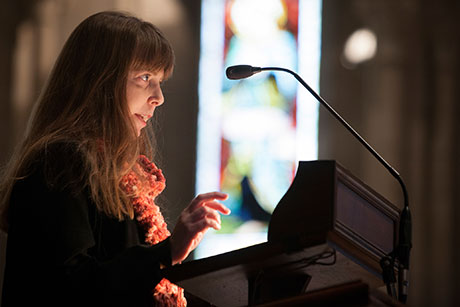Become a victor instead of a victim, DeRoller says
By Nancy Doolittle

When Rebecca DeRoller had her third child in July 1998, she had a normal delivery and went home the next day. In the weeks that followed, she felt tired and started coughing and spitting up blood. She saw her doctor, but the medication he prescribed did not help. Finally, one day she became nauseous. While she was bent over a bucket, a voice in her head said, “Rebecca, you’re dying,” and she went to an emergency room.
There, she was told her lungs were saturated with blood, her liver was three times its normal size and she was having heart failure. She was, indeed, dying.
But for DeRoller, assistant to the director of the Latin American Studies Program, hope “takes root in every moment when you decide to make a shift in your identity from victim to victor.” At her Soup and Hope talk Feb. 12 in Sage Chapel, DeRoller explained how hope sustained her through a heart transplant, meningitis, brain surgery, family difficulties, heart rejection and healing.
In 1998, the doctors stabilized DeRoller and she remained in the hospital for months before a heart became available for transplant. During surgery, however, “things went terribly wrong,” DeRoller said. She had a bad reaction to anti-rejection medicine, causing fluid retention, brain swelling and meningitis. “Surgeons had to perform emergency brain surgery and put me in a sedative-induced coma to give my heart a rest,” she said. She was in the neuro-intensive care unit for weeks before going home.
“I was so grateful to be back with my children,” DeRoller recalled. “I vowed to keep active and do as much as I could.”
DeRoller took up ice-skating, roller blading, snow-blading, basketball, volleyball and running. To meet other transplant recipients and donors, she joined the Olympic-style transplant games, competing in Louisville, St. Paul, Pittsburg, Orlando and Bangkok. “It’s quite a responsibility having someone else’s heart in you,” she said. “It makes you want to do everything possible to keep that heart healthy.”
She thanked as many donors as she could, finding hope in their generosity, particularly by a young couple who had lost their daughter but donated her heart to save the life of another child. “That mom could have no idea how many lives she affected by her unselfish decision, by her choice to become a victor rather than a victim,” DeRoller said.
Though DeRoller was doing well physically, her personal life was falling apart. She and her husband separated. And in January 2014, her body began rejecting her heart.
Deroller spent three weeks in the hospital and was given synthetic proteins so that her body would not recognize her heart as foreign. “Nobody, especially the doctors, knew if this was going to work, but it did,” she said.
DeRoller credits her hope – and making the choice to fight for her life – with her ability to pull through. “These are the moments of hope,” she said, “the times when you look at things differently; when you decide that you don’t want to suffer life’s challenges as a victim, but rather ride the wave of hope.”
Hope “is in the children laughing … the mother struggling to cope with the loss of a son whose organs now sustain the life of so many others … the smile that you extend to your neighbor,” she said.
DeRoller concluded with a poem that her daughter Amanda wrote at age 11:
As I look back on that day
Tears…Anger…Fear…
Doctors…beeping machines…
Steering the way…
A path…
A path of roots, rocks…
Dead ends…voices…
Screaming voices…
Hope was getting slim
Once a family together
Everywhere
Separated
Children calling
Longing for their mother
Cries… a family missing
Each other
One day
A life lost found a life in need
The light was bright again
They had reached the end
Or…another beginning.
Media Contact
Get Cornell news delivered right to your inbox.
Subscribe